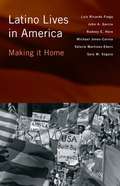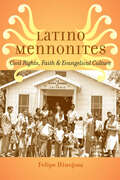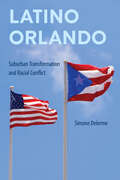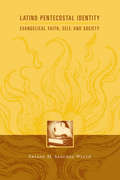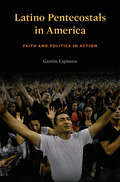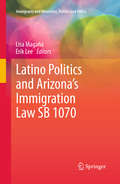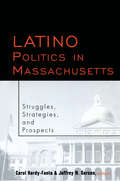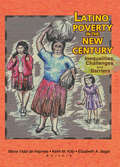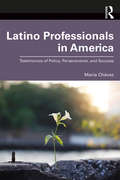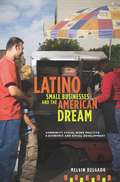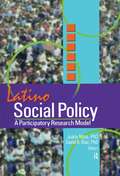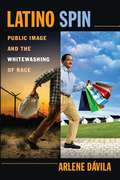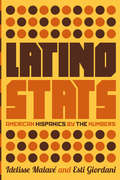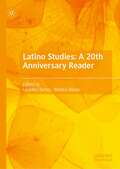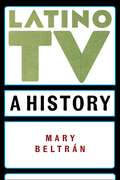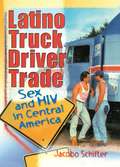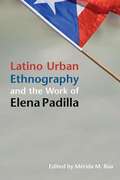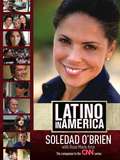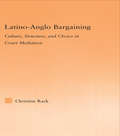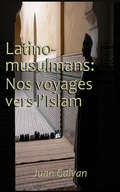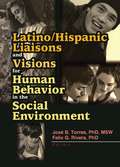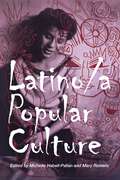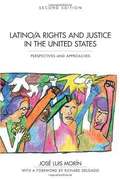- Table View
- List View
Latino Lives in America: Making It Home
by John A. Garcia Michael Jones-Correa Valerie Martinez-Ebers Gary M. Segura Luis Fraga Rodney HeroLatinos are the largest and fastest growing ethnic group in the United States, with increased levels of political mobilization and influence. In the timely and thoroughgoing Latino Lives in America,six prominent Latino scholars explore the profound implications of Latinos' population growth and geographic dispersion for American politics and society, tracking key changes and continuities in Latinos' attitudes, behavior, and social experiences. Utilizing a unique set of "narratives" from focus group interviews, supplemented with quantitative findings from the 2006 Latino National Survey, the authors provide a snapshot of Latino life in America. The Latinos interviewed provide their thoughts regarding their sense of belonging and group identification, assimilation and transnationalism, housing, education, civic engagement, and perceptions of discrimination, as well as their experiences in new destinations, where they are trying to realize the "Americano" dream. Latino Lives in America uses these conversations and the survey data to offer both a micro and macro look at how Latinos are transforming various aspects of American politics, culture, and life and how their experiences in the United States are changing them and their families.
Latino Mennonites: Civil Rights, Faith, and Evangelical Culture (Young Center Books in Anabaptist and Pietist Studies)
by Felipe HinojosaThe first historical analysis of the changing relationship between religion and ethnicity among Latino Mennonites.Winner, 2015 Américo Paredes Book Award, Center for Mexican American Studies and South Texas College.Felipe Hinojosa's parents first encountered Mennonite families as migrant workers in the tomato fields of northwestern Ohio. What started as mutual admiration quickly evolved into a relationship that strengthened over the years and eventually led to his parents founding a Mennonite Church in South Texas. Throughout his upbringing as a Mexican American evangélico, Hinojosa was faced with questions not only about his own religion but also about broader issues of Latino evangelicalism, identity, and civil rights politics.Latino Mennonites offers the first historical analysis of the changing relationship between religion and ethnicity among Latino Mennonites. Drawing heavily on primary sources in Spanish, such as newspapers and oral history interviews, Hinojosa traces the rise of the Latino presence within the Mennonite Church from the origins of Mennonite missions in Latino communities in Chicago, South Texas, Puerto Rico, and New York City, to the conflicted relationship between the Mennonite Church and the California farmworker movements, and finally to the rise of Latino evangelical politics. He also analyzes how the politics of the Chicano, Puerto Rican, and black freedom struggles of the 1960s and 1970s civil rights movements captured the imagination of Mennonite leaders who belonged to a church known more for rural and peaceful agrarian life than for social protest.Whether in terms of religious faith and identity, race, immigrant rights, or sexuality, the politics of belonging has historically presented both challenges and possibilities for Latino evangelicals in the religious landscapes of twentieth-century America. In Latino Mennonites, Hinojosa has interwoven church history with social history to explore dimensions of identity in Latino Mennonite communities and to create a new way of thinking about the history of American evangelicalism.
Latino Orlando: Suburban Transformation and Racial Conflict (Southern Dissent)
by Simone DelermeInside the experiences of immigrants from Latin America and the CaribbeanLatino Orlando portrays the experiences of first- and second-generation immigrants who have come to the Orlando metropolitan area from Puerto Rico, Cuba, Mexico, Venezuela, Colombia, and other Latin American countries. While much research on immigration focuses on urban destinations, Simone Delerme delves into a middle- and upper-class suburban context, highlighting the profound demographic and cultural transformation of an overlooked immigrant hub. Drawing on interviews, observations, fieldwork, census data, and traditional and new media, Delerme reveals the important role of real estate developers in attracting Puerto Ricans—some of the first Spanish-speaking immigrants in the region—to Central Florida in the 1970s. She traces how language became a way of racializing and segregating Latino communities, leading to the growth of suburban ethnic enclaves. She documents not only the tensions between Latinos and non-Latinos, but also the class-based distinctions that cause dissent within the Latino population. Arguing that Latino migrants are complicating racial categorizations and challenging the deep-rooted Black-white binary that has long prevailed in the American South, Latino Orlando breaks down stereotypes of neighborhood decline and urban poverty and illustrates the diversity of Latinos in the region. A volume in the series Southern Dissent, edited by Stanley Harrold and Randall M. Miller
Latino Pentecostal Identity: Evangelical Faith, Self, and Society (Religion and American Culture)
by Arlene Sánchez WalshOf the thirty-seven million Latinos living in the United States, nearly five million declare themselves to be either Pentecostal or Charismatic, and more convert every day. Latino Pentecostal Identity examines the historical and contemporary rise of Pentecostalism among Latinos, their conversion from other denominations, and the difficulties involved in reconciling conflicts of ethnic and religious identity. The book also looks at how evangelical groups encourage the severing of ethnic ties in favor of spiritual community and the ambivalence Latinos face when their faith fails to protect them from racial discrimination. Latinos are not new to Pentecostalism; indeed, they have been becoming Pentecostal for more than a hundred years. Thus several generations have never belonged to any other faith. Yet, as Arlene M. Sánchez Walsh articulates, the perception of adherents as Catholic converts persists, eliding the reality of a specific Latino Pentecostal population that both participates in the spiritual and material culture of the larger evangelical Christian movement and imprints that movement with its own experiences. Focusing on three groups of Latino Pentecostals/Charismatics—the Assemblies of God, Victory Outreach, and the Vineyard—Sánchez Walsh considers issues such as the commodification of Latino evangelical culture, the Latinization of Pentecostalism, and the ways in which Latino Pentecostals have differentiated themselves from the larger Latino Catholic culture. Extensive fieldwork, surveys, and personal interviews inform her research and show how, in an overwhelmingly Euro-American denomination, diverse Latino faith communities—U.S. Chicano churches, pan–Latin American immigrant churches, and mixed Latin American and U.S. Latino churches—have carved out their own unique religious space.
Latino Pentecostals in America: Faith and Politics in Action
by Gastón EspinosaThis &“excellent study&” of the Latino Pentecostal movement is &“an important resource for understanding the future of Christianity in North America&” (Choice). Every year an estimated 600,000 U.S. Latinos convert from Catholicism to Protestantism, a transformation spearheaded by the Pentecostal movement and Assemblies of God. Latino Assemblies of God leaders—and their 2,400 churches across the nation—represent a new and growing force in denominational, Evangelical, and presidential politics. In a deeply researched social and cultural history, Gastón Espinosa uncovers the roots and contemporary developments of this remarkable turn.Latino Pentecostals in America traces the Latino AG back more than a century, to the Azusa Street Revivals in Los Angeles and Apostolic Faith Revivals in Houston from 1906 to 1909. Espinosa describes the uphill struggles for indigenous leadership, racial equality, women in the ministry, social and political activism, and immigration reform. Their outspoken commitment to an active faith has led a new generation of leaders to combine the reconciling message of Billy Graham with the social transformation politics of Martin Luther King Jr. This eye-opening study explains why this group of working-class Latinos once called "the Silent Pentecostals" is silent no more. By giving voice to their untold story, Espinosa enriches our understanding of the diversity of Latino religion, Evangelicalism, and American culture.
Latino Politics and Arizona’s Immigration Law SB 1070
by Lisa Magaña Erik LeeArizona has one of the fastest growing communities of Latino immigrants in the United States. In response to accusations that the Federal government was hampering the immigration enforcement actions of Arizona police, state Senator Russell Pearce introduced the "Support Our Law Enforcement and Safe Neighborhoods Act." Better known as SB 1070, the policy allows police officers in Arizona to arrest unauthorized immigrants under the state's trespassing law. The law also gives officers the latitude to question and detain those that may appear suspicious, which may simply mean that they appear Latino. Under the State's statute, immigrants can also be criminalized for their mere presence in Arizona. The bill was signed into law on April 23, 2010, which generated a number of immensely complex issues at the local, national and international level The measure has affected an already problematic U.S.-Mexico, bi-national relationship at a time of increased security cooperation between the two countries. Furthermore, former the President of Mexico has criticized the law, issuing travel advisories, and as a sanction, trade between Arizona and Mexico has been reduced. Elected officials across the country called for a variety of economic boycotts and campaigns that would discourage the full implementation of the law. Over fifteen major cities have ended business contracts with Arizona. The State tourism industry has lost almost one billion dollars in less than six months as a result of this policy. This book examines a variety of issues and consequences of SB 1070 at the local, national and international level. It provides timely research and analysis on a topic not previously examined and from a variety of inter disciplinary approaches, making it of interest to political scientists and policy-makers alike.
Latino Politics in Massachusetts: Struggles, Strategies and Prospects (Race and Politics #4)
by Carol Hardy-Fanta Jeffrey GersonThis collection of original essays explores the major challenges to Latino political representation in cities where Latino populations do not make up the majority of the population and therefore cannot rely on sheer numbers to gain representation.
Latino Poverty in the New Century: Inequalities, Challenges, and Barriers
by Elizabeth Segal Keith Kilty Maria Vidal De HaymesUnderstand the social factors that challenge this fast-growing community!The Latino community will soon be the largest minority population in the United States. Although Hispanics have been part of the American scene since before independence, their issues have only recently drawn the attention of the mainstream. Latino Poverty in the New Century takes a clear look at the reasons why poverty and inequality are still major concerns for Hispanic citizens and residents. This keen analysis examines how apparently neutral, even well-meaning social and educational policies can have a devastating effect. The interlocking consequences of language problems, educational problems, gangs, poverty, and illness become a vicious cycle. Despite pervasive patterns of discrimination and subtle barriers to achievement, the Latino community still displays its power. Latino Poverty in the New Century reveals how a faith-based community organization succeeded in adapting indigenous networks and culturally relevant sources of support and power to create a strong community presence.Latino Poverty in the New Century offers a rich, detailed analysis of the challenges that face Hispanics in the United States: the implications of US immigration policy for immigrants, refugees, and native-born Latino citizens the language barriers that can prevent Latinos from full participation in both society and educational programs health care policies and the sometimes tragic consequences of the lack of medical insurance the role of extracurricular activities in keeping Latino students in school the twin calamities known as gentrification and urban blightThis comprehensive book provides social workers and policymakers with wide-ranging analyses of some of the pressing issues and social policies that affect Hispanics in the United States. Latino Poverty in the New Century explores ways to keep Latino youth in high school, promote community organization, encourage Latinos to vote, and increase your understanding of migration dynamics. Containing current research and case studies, this valuable book will help you comprehend the challenges that Latinos face in this country and respect the gains they have made in spite of the obstacles in their way.
Latino Professionals in America: Testimonios of Policy, Perseverance, and Success
by Maria ChávezIn Latino Professionals in America, Maria Chávez combines rich qualitative interviews, auto-ethnographic accounts, and policy analysis to explore the converging oppressions that make it difficult for Latinos to become professionals and to envision themselves as successful in those professions. Recounting her own story, Chávez interviews 31 Latino professionals from across the nation in a variety of occupations and careers, contextualizing their experiences amid family struggles and ongoing racism in the United States. She addresses gender inequality within the Latino community, arguing that by defending, rationalizing, or ignoring patriarchy within the Latino community perpetuates systems of oppression—especially for women; gay, lesbian, bisexual, transgender, and queer individuals; and others at the intersections. The experiences of these Latino professionals and the author’s analysis provide a blueprint for what works—one, both pragmatic and hopeful, that uses real lives to illustrate how a combination of public policies, people, and perseverance increases the presence of America’s fastest-growing demographic group in the professional class.
Latino Representation in State Houses and Congress
by Jason P. CasellasThis book argues that Latino representation in U. S. legislative institutions is shaped not only by demographics but by legislative institutional design, as well as elite-driven methods, features of the electoral system, and the increasing mainstreaming of Latinos in American society. The election of Latino legislators in the United States is thus complex and varied. This book provides evidence on how successful Latinos have been in winning state legislative and congressional districts in which they have no natural advantage. In particular, this book demonstrates that Latino candidates benefit from higher percentages of Latino citizens in the state, more liberal citizenries, and citizen legislatures. Jason Casellas argues that the legislatures most conducive to the election of Latino candidates are Florida, New Mexico, and California, whereas the least conducive are the U. S. House and New York.
Latino Small Businesses and the American Dream: Community Social Work Practice and Economic and Social Development
by Melvin DelgadoLatino small businesses provide social, economic, and cultural comfort to their communities. They are also excellent facilitators of community capacity—a major component of effective social work practice. Social work practitioners have a vested interest in seeing such businesses grow, not only among Latinos but all communities of color. Reviewing the latest research on formal and informal economies within urban communities of color, Melvin Delgado lays out the demographic foundations for a richer collaboration between theory and practice. Delgado deploys numerous case studies to cement the link between indigenous small businesses and community well-being. Whether regulated or unregulated, these establishments hire from within and promote immigrant self-employment. Latino small businesses often provide jobs for those whose criminal and mental health backgrounds intimidate conventional businesses. Recently estimated to be the largest group of color running small businesses in the United States, Latino owners top two million, with the number expected to double within the next few years. Joining an understanding of these institutions with the kind of practice that enables their social and economic improvement, Delgado explains how to identify and mobilize the kinds of resources that best spur their development.
Latino Social Policy: A Participatory Research Model
by David Diaz Juana MoraExamine alternative strategies to resolving important Latino social issues! Latino Social Policy: A Participatory Research Model examines the failure of traditional research methods to address major social needs in Latino communities, promoting instead a participatory/action approach to research that is socially-and scientifically-meaningful. Experts from a variety of disciplines focus on nontraditional strategies that engage community residents in community-research projects, shortening the distance between the researcher and the "subject." This unique book recounts lessons learned on conducting Participatory Action Research (PAR) in Latino communities using techniques based on anthropology, education, community health and evaluation, and urban planning. Latino Social Policy: A Participatory Research Model addresses non-traditional methods of reducing the tension between the reality of interaction with the subject community and the academic training structures used by researchers. The book promotes a new vision and practice of research design in which the "subject" is central to the process, advocating a participatory approach to produce qualitatively different research based on community identified problems and needs. Contributors examine the value of integrating local knowledge, language, and culture into the methodological design, the ethics of conducting research in Latino communities, and the internal conflicts Chicana/o researchers face within their profession and in the field. Topics addressed in Latino Social Policy: A Participatory Research Model include: community health and Central Americans in Los Angeles ethnography and substance abuse among transnational Mexican farmworkers identity and field research in Mexico the Latino Coalition for a New Los Angeles (LCNLA) researcher/community partnerships and much more! Latino Social Policy: A Participatory Research Model includes case studies, ethnographies, and vignettes that illustrate participatory approaches and outcomes in Latino research. The book is equally valuable as a textbook for academics and students working in the social sciences, public policy, and urban planning, and as a professional guide for community leaders and organizations interested in developing research partnerships.
Latino Spin: Public Image and the Whitewashing of Race
by Arlene DávilaWinner of the 2010 Distinguished Book Award in Latino Studies from the Latin American Studies AssociationFollows the Latino public image and its impact on U.S. national identityIllegal immigrant, tax burden, job stealer. Patriot, family oriented, hard worker, model consumer. Ever since Latinos became the largest minority in the U.S. they have been caught between these wildly contrasting characterizations leaving us to wonder: Are Latinos friend or foe?Latino Spin cuts through the spin about Latinos’ supposed values, political attitudes, and impact on U.S. national identity to ask what these caricatures suggest about Latinos’ shifting place in the popular and political imaginary. Noted scholar Arlene Dávila illustrates the growing consensus among pundits, advocates, and scholars that Latinos are not a social liability, that they are moving up and contributing, and that, in fact, they are more American than “the Americans.” But what is at stake in such a sanitized and marketable representation of Latinidad? Dávila follows the spin through the realm of politics, think tanks, Latino museums, and urban planning to uncover whether they effectively challenge the growing fear over Latinos’ supposedly dreadful effect on the “integrity” of U.S. national identity. What may be some of the intended or unintended consequences of these more marketable representations in regard to current debates over immigration?With particular attention to what these representations reveal about the place and role of Latinos in the contemporary politics of race, Latino Spin highlights the realities they skew and the polarization they effect between Latinos and other minorities, and among Latinos themselves along the lines of citizenship and class. Finally, by considering Latinos in all their diversity, including their increasing financial and geographic disparities, Dávila can present alternative and more empowering representations of Latinidad to help attain true political equity and intraracial coalitions.
Latino Stats
by Idelisse Malavé Esti GiordaniAt a time when politics is seemingly ruled by ideology and emotion and when immigration is one of the most contentious topics, it is more important than ever to cut through the rhetoric and highlight, in numbers, the reality of the broad spectrum of Latino life in the United States. Latinos are both the largest and fastest-growing racial/ethnic group in the country, even while many continue to fight for their status as Americans.Respected movement builder and former leader of the Tides Foundation Idelisse Malavé and her daughter, Celeste Giordani--a communications strategist for the Social Transformation Project--distills the profusion of data, identifying the most telling and engaging facts to assemble a portrait of contemporary Latino life with glimpses of the past and future. From politics and the economy to popular culture, the arts, and ideas about race, gender, and family, Latino Stats both catalogs the inequities that plague Latino communities and documents Latinos' growing power and influence on American life.An essential tool for advocates, educators, and policy makers, Latino Stats will be a go-to guidebook for anyone wanting to raise their awareness and increase their understanding of the complex state of our nation.
Latino Studies: A 20th Anniversary Reader
by Lourdes Torres Marisa AliceaThis book highlights cutting-edge articles published in the journal, Latino Studies, over the last two decades. It features the work of leading and emerging scholars whose innovative theoretical and conceptual contributions to Latinx studies have shaped scholarly debates in our interdisciplinary field and continue to have an impact. This collection embraces a broad range of topics organized in four sections representative of major themes in Latinx studies including: Latinidades/Identidades, Race/Racialization, Migration/Immigration, and Legality/Citizenship/Belonging. Latino Studies: A 20th Year Anniversary Reader will be an indispensable resource for students and scholars looking for a robust interdisciplinary introduction to Latinx studies, the pivotal issues and debates that have shaped the field over the recent past, and directions for future research.
Latino TV: A History (Critical Cultural Communication)
by Mary BeltránThe history of Latina/o participation and representation in American televisionWhose stories are told on television? Who are the heroes and heroines, held up as intriguing, lovable, and compelling? Which characters are fully realized, rather than being cardboard villains and sidekicks? And who are our storytellers? The first-ever account of Latino/a participation and representation in US English-language television, Latino TV: A History offers a sweeping study of key moments of Chicano/a and Latino/a representation and authorship since the 1950s. Drawing on archival research, interviews with dozens of media professionals who worked on or performed in these series, textual analysis of episodes and promotional materials, and analysis of news media coverage, Mary Beltrán examines Latina/o representation in everything from children’s television Westerns of the 1950s, Chicana/o and Puerto Rican activist-led public affairs series of the 1970s, and sitcoms that spanned half a century, to Latina and Latino-led series in the 2000s and 2010s on broadcast, cable, and streaming outlets, including George Lopez, Ugly Betty, One Day at a Time, and Vida. Through the exploration of the histories of Latina/o television narratives and the authors of those narratives, Mary Beltrán sheds important light on how Latina/os have been included—and, more often, not—in the television industry and in the stories of the country writ large.
Latino Truck Driver Trade: Sex and HIV in Central America
by Johnny MadrigalWhat do truckers do about their sexual needs on the road?This startling and unique study examines the on-the-road sex lives of Central American truck drivers. It takes a quantitative and qualitative look at the extent of homosexuality, prostitution, drug use, and vulnerability to HIV infection among these men who operate in a strangely unique sexual culture. Latino Truck Driver Trade: Sex and HIV in Central America documents the extent of their sexual activities with both men and women as well as drug use and prostitution among this population. Honest and revealing, this valuable book uncovers the incredible danger that truck drivers put themselves in by risking HIV infection and why Latin sexual culture does not always define men who participate in acts with other men as “homosexual.” Latino Truck Driver Trade explores the concept of “machismo” and why truck drivers act very “manly” (to avoid being teased or being made fun of).Through interviews with truck drivers, this detailed account gives insight into how friends pressure others to perform sexual acts, drink alcohol, and take drugs in order to “fit in.” Latino Truck Driver Trade: Sex and HIV in Central America provides suggestions for HIV prevention programs to decrease the spread of HIV that is prevalent among this group shows how theories of homosexuality fail to account for its widespread practice among Latino heterosexual men explores the sexual practices of these men questions basic assumptions about Latin machismo demonstrates how Latino men can practice homosexuality without acquiring a gay identity shows how this international truck driver culture will impact the U. S.Latino Truck Driver Trade explicitly examines the on-the-road lifestyles of Central American truckers, revealing that many times they are completely the opposite of the quiet, “normal” lives these men lead at home.
Latino Urban Ethnography and the Work of Elena Padilla
by Merida M. RuaThis study reclaims and builds upon the classic work of anthropologist Elena Padilla in an effort to examine constructions of space and identity among Latinos. The volume includes an annotated edition of Padilla's 1947 University of Chicago master's thesis, "Puerto Rican Immigrants in New York and Chicago: A Study in Comparative Assimilation," which broke with traditional urban ethnographies and examined racial identities and interethnic relations. Weighing the importance of gender and the interplay of labor, residence, and social networks, Padilla examined the integration of Puerto Rican migrants into the social and cultural life of the larger community where they settled. Also included are four comparative and interdisciplinary original essays that foreground the significance of Padilla's early study about Latinos in Chicago. Contributors discuss the implications of her groundbreaking contributions to urban ethnographic traditions and to the development of Puerto Rican studies and Latina/o studies. Contributors are Nicholas De Genova, Zaire Z. Dinzey-Flores, Elena Padilla, Ana Y. Ramos-Zayas, Mérida M. Rúa, and Arlene Torres.
Latino in America
by Soledad O'BrienNewsanchor Soledad O'Brien takes an in-depth look at today's Latino experience-- as her own-- with interviews, pictures, and travelogues about the country's largest minority...
Latino-Anglo Bargaining: Culture, Structure and Choice in Court Mediation (Latino Communities: Emerging Voices - Political, Social, Cultural and Legal Issues)
by Christine RackThis book shows the mechanisms by which cultural differences reinforce structural privilege and disadvantage in the informal process of mediated negotiation. Are all people equally likely to pursue their own material self-interest in the negotiation process used in small claims mediation? Did Latinos and Anglos bargain more generously with members of their own group? The central questions, derived from theories of ethnic and gender differences, concerned how, and to what degree; culture, structure, and individual choice operated to alter the goals, bargaining process and outcomes, expressed motivations and outcome evaluations for outsider groups. This book demonstrates how there are real cultural differences in the way that Latinos and Anglos pursue monetary justice that defy dominant assumptions that all culture groups are equally likely to maximize their own outcomes at the expense of others.
Latino-Muslime: Unser Weg zum Islam
by Juan GalvanWie kommt es, dass immer mehr Latinos zum Islam konvertieren? In diesem Buch erzählen zahlreiche Latinos aus vielen verschiedenen Ländern ihre spannende und ganz individuelle Geschichte. Sie berichten von ihren Erfahrungen mit anderen Religionen, mit verschiedenen islamischen Richtungen, mit dem Widerstand der Familie und dem Freundeskreis und immer wieder von der Erfüllung und dem Frieden, die ihnen der Islam gebracht hat.
Latino-Musulmans : Nos voyages vers l'Islam
by Juan GalvanLatino-Musulmans : Nos voyages vers l'islam est un recueil d'histoires sur les voyages personnels de personnes vers la vérité. Il raconte leurs combats, leurs découvertes et leurs révélations pendant leur voyage avant de finalement trouver la paix dans l'islam. De Michael Wolfe, auteur de Hadj : An American's Pilgrimae to Mecca... "Voici un livre qui remplira vos oreilles d'un choeur de voix que vous n'avez peut-être jamais entendu aussi clairement. Ce que j'aime dans cette grande collection de textes de témoignages introduits avec soin est sa variété, son instabilité, son ouverture, sa portée. D'une part, les lecteurs qui connaissent peu l'islam et son histoire seront surpris par l'idée même de convertis à l'islam d'origine hispanique. Ils devraient se préparer à des rappels : l'espagnol est rempli de mots arabes ; les ressemblances architecturales entre le Mexique et le Moyen-Orient ne sont pas accidentelles ; l'Espagne le perle sociale, culturelle et intellectuelle de l'Europe médiévale était remplie de musulmans de La Mecque, de Damas et du Maroc pendant au moins huit siècles ; un grand nombre de catholiques romains et laïques vivent actuellement en Espagne et dans ses lointaines ex-colonoies du Nouveau Monde, qui peuvent, s'ils le souhaitent, retracer leurs arbres généalogiques avec des familles musulmanes anciennes ; et sans oublier bien sûr que Jésus a toujours joué un rôle essentiel dans la théologie islamique et la vie musulmane. D'autre part, les musulmans qui savent aujourd'hui toutes ces choses pourraient également être surpris par le livre de Juan Galvan, car les voix ne vont pas de main morte, ni cachent les aspects problématiques de l'adoption d'une nouvelle religion par choix. Nos voyages est un ensemble de voix humaines réelles se délectant de la beauté de la découverte, mais également prises aux contraintes d'une décision qui peut facilement semer la confusion chez les gens q
Latino/Hispanic Liaisons and Visions for Human Behavior in the Social Environment
by Felix G RiveraAdd to your knowledge of Latino/Hispanic diversity, attitudes, behaviors, and experiences to provide more effective services!Latino-Hispanic Liaisons and Visions for Human Behavior in the Social Environment dispels pervasive historical and contemporary misconceptions and inaccuracies and highlights the diversity of Latino/Hispanic experiences to help you provide more effective services to those clients. As editors Torres and Rivera point out, “Literature on Latinos/Hispanics reflects a dysfunctional and myopic cultural view in which they are often depicted in stereotypic characteristics and as a homogenous population.”In Latino-Hispanic Liaisons and Visions for Human Behavior in the Social Environment, you&’ll find chapters examining: the social ecology of Mexican-American child development caregiver well-being among Cuban and Puerto Rican mothers of mentally retarded adults the adjustment process among Cuban refugee families one Southwestern community’s efforts to create a multiethnic neighborhood coalition against substance abuse a study of changes related to migration, family, and work in Caribbean women’s lives and much more!
Latino/a Popular Culture
by Michelle Habell-PallanScholars from the humanities and social sciences analyze representations of Latinidad in a diversity of genres Latinos have become the largest ethnic minority group in the United States. While the presence of Latinos and Latinas in mainstream news and in popular culture in the United States buttresses the much-heralded Latin Explosion, the images themselves are often contradictory. In Latino/a Popular Culture, Habell-Pallán and Romero have brought together scholars from the humanities and social sciences to analyze representations of Latinidad in a diversity of genres—media, culture, music, film, theatre, art, and sports—that are emerging across the nation in relation to Chicanas, Chicanos, mestizos, Puerto Ricans, Caribbeans, Central Americans and South Americans, and Latinos in Canada. Contributors include Adrian Burgos, Jr., Luz Calvo, Arlene Dávila, Melissa A. Fitch, Michelle Habell-Pallán, Tanya Katerí Hernández, Josh Kun, Frances Negron-Muntaner, William A. Nericcio, Raquel Z. Rivera, Ana Patricia Rodríguez, Gregory Rodriguez, Mary Romero, Alberto Sandoval-Sánchez, Christopher A. Shinn, Deborah R. Vargas, and Juan Velasco. Cover artwork "Layering the Decades" by Diane Gamboa, 2002, mixed media on paper, 11 X 8.5". Copyright 2001, Diane Gamboa. Printed with permission.
Latino/a Rights And Justice In The United States: Perspectives And Approaches (Second Edition)
by José Luis MorínA much-needed and thought-provoking examination of a significant and growing population within the United States, Latino/a Rights and Justice in the United States explores the inequalities and injustices that Latino/a communities confront in the United States. Author Jos Luis Morn provides a deeper understanding of the historical and contemporary Latino/a experience of discrimination and economic and social injustice and presents insights into the elusiveness of equality and fairness for Latinos/as in the United States. Offering ideas on how to reduce bias and other inequities within the justice system and the greater society, Morn calls for alternative approaches to working with Latino/a youths and families and a broadening of existing concepts of rights and justice in the United States. Drawing the link between the international and domestic dimensions of the Latino/a presence in the United States, Morn incorporates international human rights norms and principles of economic, social, and cultural rights to address the persistent inequalities and injustices that Latino/a communities confront in the United States. The second edition provides new and expanded coverage about racial and ethnic bias in law enforcement and the criminal justice system, citizenship rights, immigration and crime, Latinos/as and U.S. prisons, the contemporary street gang phenomenon, and Latinos/as in the post-9/11 era. Meticulous in presenting facts and research, Latino/a Rights and Justice in the United States often challenges conventional ideas and popular myths about Latinos/as on these and other topics.
